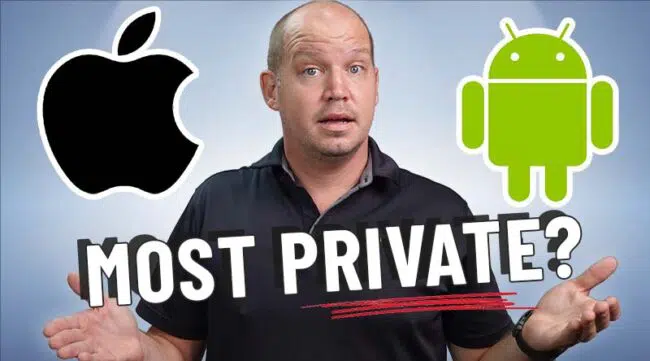The debate between iOS vs Android security has been going on for some time now, and I can’t really see it coming to an end soon. While both have their own advantages, which device comes on top when it comes to security and privacy? In this video, my friend Pete Matheson and I will walk you through a quick comparison of the two.

Key Takeaways
- iOS, with its “walled garden” approach, ensures a highly secure and private ecosystem compared to Android’s multi-layered system.
- Apple’s app sandbox, part of the iOS security stack, imposes stricter limits on third-party access to user data than Android.
- iPhones, under Apple’s control of both hardware and software, may provide enhanced mobile security, while Android embraces diverse manufacturers and cutting-edge hardware features.
- Privacy and security risks are largely dependent on the amount of personal data stored on the device, irrespective of the operating system.
To properly compare the security and privacy of iOS and Android, we’re going to cover four specific areas of concern:
Operating System | Which is More Secure?
When it comes to your privacy and security, there’s one primary principle:
“The more links there are to a chain, the more opportunities there are to introduce a weak link.”
What does this mean? Let’s look at the operating systems of Apple and Android smartphones.
In 2007, Apple introduced the integration of hardware and software. This native integration, which most call a Walled Garden, allows for much more control. This tight control over iOS devices is achieved through the use of the Apple app store, setting it apart from the less controlled environment of Android phones with tons of third party app stores.
Android mobile devices have an operating system that is often three levels deep: the Android base OS, manufacturer-specific design, and network-specific features. Each layer adds a bit of complexity and vulnerability to the operating system.
Another important thing to add is the unreliable security patches and updates in the Android operating system. In general, you would want updates to happen as soon as the device needs them to, but based on Pete’s Google Pixel experience, the monthly OS updates aren’t very reliable.
For instance, even though monthly updates have come out every single month, some are delayed. Meanwhile, in his iPhone 13 Pro, he noticed that Apple is a lot more on top of releasing both minor and major iOS updates to tackle security vulnerabilities, as well as smaller bug fixes.
User Tracking on iOS vs Android
It’s quite ironic because the features that make modern smartphones so attractive are the same ones that make them more vulnerable to mobile security threats.
- alarmingly accurate GPS location
- an active camera
- an active microphone
- higher intelligence in storing your personal data
So how do Apple’s iOS devices compare to Android in terms of user tracking?
As far as third-party apps are concerned, Apple has what it calls an app sandbox, which limits what kind of data apps can access.
As for Android, Pete shared that a privacy sandbox is coming, but it might come out in two years because of some conflict of interest.
By conflict of interest, he means that there’s a divide between the consumers who buy their phones and the advertisers who make up the bulk of Google’s revenue. It’s a difficult balancing act.
But I will add that Apple has that balancing act as well although, for them, it’s more on the regulatory side. For instance, last year, it was quietly announced that Apple would start scanning the images uploaded to iCloud to monitor for child sexual abuse material. However, this update was delayed because of the vocal backlash from privacy advocates.
In the end, whether you’re using an iOS or Android, it’s best to assume that there is some form of tracking that is or will start happening soon. The best thing you can do is to only permit apps to use specific types of data or specific parts of your mobile phone when they absolutely need it.
Messaging on Apple iOS vs Google’s Android
To start, you need to understand that the old-school SMS message has never and will never be encrypted. Anything sent via SMS text message, even on a modern app or Android device is not private. However, each service has its closed-off network that offers end-to-end encrypted messaging. For Apple, that’s iMessage, while Android also has encrypted messaging.
But if you’re sending anything sensitive and would feel safer using an encrypted messaging service, I recommend you use Signal. It’s my preferred encrypted messaging service provider.
The Actual Mobile Hardware | Which is More Secure?
In terms of devices, Apple controls everything while Android does not. In this case, the advantage might lean towards Android. So, if you want cutting-edge devices with the latest features, you definitely go with Android, because Apple usually takes their time perfecting those features before they release it.
But here’s an important takeaway…
It doesn’t matter how secure or private the actual hardware of your phone is. Although yes, I think that Apple offers a few advantages over Android. But at the end of the day, it all comes down to how much of your data is stored on your mobile device.
Alternative to iOS and Android Operating Systems
If you don’t want to trust big tech companies like Apple and Google, I totally get that. Here are some alternative options you can use:
But remember, although you may gain privacy by using these alternative operating systems, you may also lose the ease of installation, app availability, and general use. There are thankfully a number of secure phone options that allow you to run these custom operating systems.
Overall, the debate between iPhone and Android devices is honestly hard to settle and it usually comes down to subjective preference. So whether you’re an iPhone or Android user, the strength of your privacy and security ultimately comes down to how much of your personal data is stored in these devices.
Be sure to subscribe to the All Things Secured YouTube channel!

